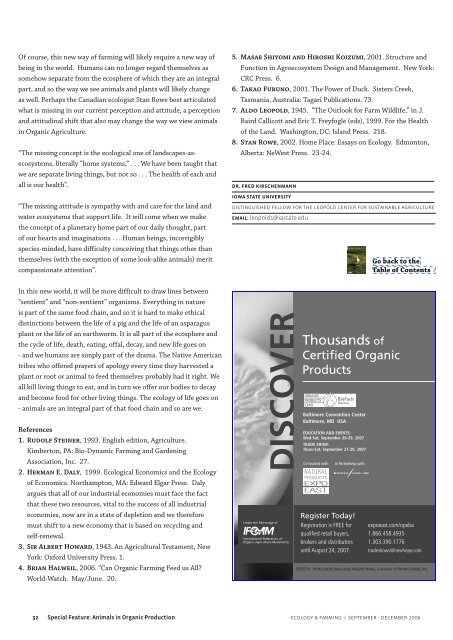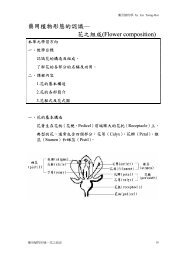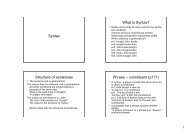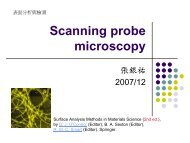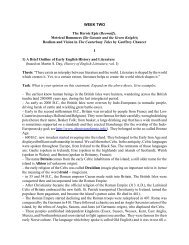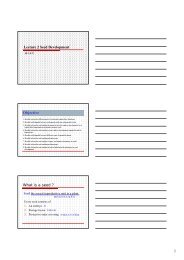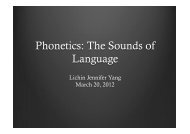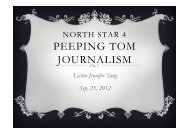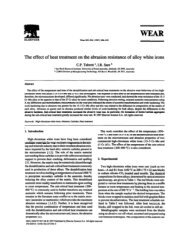Ecology and Farming
Ecology and Farming
Ecology and Farming
Create successful ePaper yourself
Turn your PDF publications into a flip-book with our unique Google optimized e-Paper software.
Of course, this new way of farming will likely require a new way of<br />
being in the world. Humans can no longer regard themselves as<br />
somehow separate from the ecosphere of which they are an integral<br />
part, <strong>and</strong> so the way we see animals <strong>and</strong> plants will likely change<br />
as well. Perhaps the Canadian ecologist Stan Rowe best articulated<br />
what is missing in our current perception <strong>and</strong> attitude, a perception<br />
<strong>and</strong> attitudinal shift that also may change the way we view animals<br />
in Organic Agriculture.<br />
“The missing concept is the ecological one of l<strong>and</strong>scapes-as-<br />
ecosystems, literally “home systems,” . . . We have been taught that<br />
we are separate living things, but not so . . . The health of each <strong>and</strong><br />
all is our health”.<br />
“The missing attitude is sympathy with <strong>and</strong> care for the l<strong>and</strong> <strong>and</strong><br />
water ecosystems that support life. It will come when we make<br />
the concept of a planetary home part of our daily thought, part<br />
of our hearts <strong>and</strong> imaginations . . . Human beings, incorrigibly<br />
species-minded, have difficulty conceiving that things other than<br />
themselves (with the exception of some look-alike animals) merit<br />
compassionate attention”.<br />
In this new world, it will be more difficult to draw lines between<br />
“sentient” <strong>and</strong> “non-sentient” organisms. Everything in nature<br />
is part of the same food chain, <strong>and</strong> so it is hard to make ethical<br />
distinctions between the life of a pig <strong>and</strong> the life of an asparagus<br />
plant or the life of an earthworm. It is all part of the ecosphere <strong>and</strong><br />
the cycle of life, death, eating, offal, decay, <strong>and</strong> new life goes on<br />
- <strong>and</strong> we humans are simply part of the drama. The Native American<br />
tribes who offered prayers of apology every time they harvested a<br />
plant or root or animal to feed themselves probably had it right. We<br />
all kill living things to eat, <strong>and</strong> in turn we offer our bodies to decay<br />
<strong>and</strong> become food for other living things. The ecology of life goes on<br />
- animals are an integral part of that food chain <strong>and</strong> so are we.<br />
References<br />
1. Rudolf Steiner, 1993. English edition, Agriculture.<br />
Kimberton, PA: Bio-Dynamic <strong>Farming</strong> <strong>and</strong> Gardening<br />
Association, Inc. 27.<br />
2. Herman E. Daly, 1999. Ecological Economics <strong>and</strong> the <strong>Ecology</strong><br />
of Economics. Northampton, MA: Edward Elgar Press. Daly<br />
argues that all of our industrial economies must face the fact<br />
that these two resources, vital to the success of all industrial<br />
economies, now are in a state of depletion <strong>and</strong> we therefore<br />
must shift to a new economy that is based on recycling <strong>and</strong><br />
self-renewal.<br />
3. Sir Albert Howard, 1943. An Agricultural Testament, New<br />
York: Oxford University Press. 1.<br />
4. Brian Halweil, 2006. “Can Organic <strong>Farming</strong> Feed us All?<br />
World-Watch. May/June. 20.<br />
5. Masae Shiyomi <strong>and</strong> Hiroshi Koizumi, 2001. Structure <strong>and</strong><br />
Function in Agroecosystem Design <strong>and</strong> Management. New York:<br />
CRC Press. 6.<br />
6. Takao Furuno, 2001. The Power of Duck. Sisters Creek,<br />
Tasmania, Australia: Tagari Publications. 73.<br />
7. Aldo Leopold, 1945. “The Outlook for Farm Wildlife,” in J.<br />
Baird Callicott <strong>and</strong> Eric T. Freyfogle (eds), 1999. For the Health<br />
of the L<strong>and</strong>. Washington, DC: Isl<strong>and</strong> Press. 218.<br />
8. Stan Rowe, 2002. Home Place: Essays on <strong>Ecology</strong>. Edmonton,<br />
Alberta: NeWest Press. 23-24.<br />
dr. Fred KirSchenmann<br />
iOwa State univerSity<br />
DiStinguiShED FEllow For thE lEopolD cEntEr For SuStainablE agriculturE<br />
email: leopold1@iastate.edu<br />
Under the Patronage of<br />
DISCOVER<br />
International Federation of<br />
Organic Agriculture Movements<br />
Thous<strong>and</strong>s of<br />
Certified Organic<br />
Products<br />
Baltimore Convention Center<br />
Baltimore, MD USA<br />
EDUCAtion AnD EvEntS:<br />
Wed-Sat, September 26-29, 2007<br />
trADE ShoW:<br />
thurs-Sat, September 27-29, 2007<br />
Co-located with<br />
In Partnership with<br />
Register Today!<br />
Registration is FREE for<br />
qualified retail buyers,<br />
brokers <strong>and</strong> distributors<br />
until August 24, 2007.<br />
Go back to the<br />
Table of Contents ><br />
expoeast.com/opeba<br />
1.866.458.4935<br />
1.303.390.1776<br />
tradeshows@newhope.com<br />
EE07031 Produced by New Hope Natural Media, a division of Penton Media, Inc.<br />
AT EcoFarm_qrt vert_bw.indd 1 1/16/07 11:29:11 AM<br />
32 Special Feature: Animals in Organic Production <strong>Ecology</strong> & <strong>Farming</strong> | SEptEmbEr - DEcEmbEr 2006


